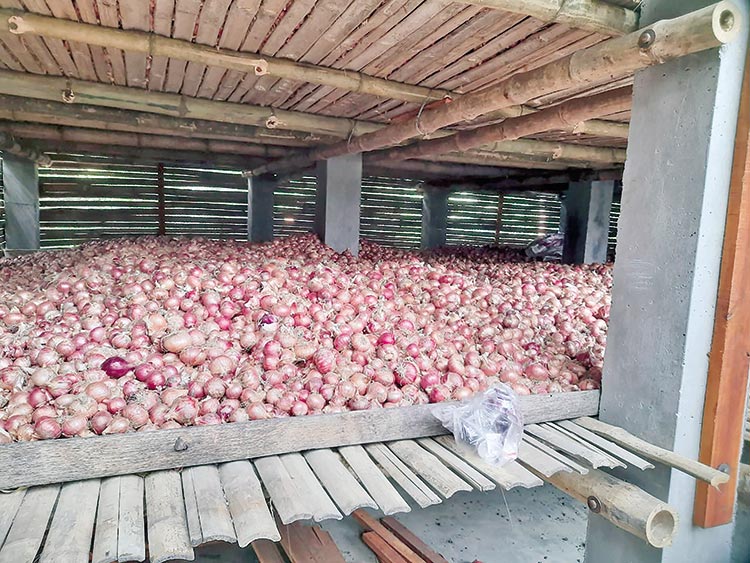Amanur Aman
Published:2024-07-28 21:16:36 BdST
10,000 tonnes of onions stocked in 285 storage houses
More than 10,000 tonnes of onions have been stocked in 285 model storage houses across seven southern, western, and northern districts of the country, according to the Department of Agricultural Marketing (DAM) and local onion farmers.
The districts include Kushtia, Jhenaidah, Magura, Faridpur, and Rajbari in the southwest, and Rajshahi and Pabna in the north.
Each of the 285 storage houses has a capacity of 250 to 300 maunds (10 to 12 tonnes) of onions. However, farmers have stocked nearly double or even triple this amount in some cases.
DAM and District Agriculture Extension Department (DoAE) officials report that these seven districts produce about 50% of the total onions in the country.
A significant portion of the onions produced during the peak season cannot be utilised effectively, leading to low prices. Farmers are forced to sell at low prices to cover production costs, with much of the onion supply ending up in the hands of brokers and hoarders who then control the market for profit.
To combat this issue, the government decided to construct “model storage houses” in these districts.
Each model storage house features six exhaust ventilation fans to prevent rot, a hygrometer to measure temperature and humidity and is approximately 375 square feet in size. These storage houses have a durability of 15 to 20 years and can store onions for five to seven months. Every five farmers share one house, built under the project to modernise onion and garlic storage systems and develop marketing activities at the farmer level. The project runs from July 2021 to June 2026, with a total budget of Tk25 crore.
So far, 285 out of the planned 300 houses have been constructed across 12 upazilas in the seven districts and were inaugurated in 2023.
This season, onions were cultivated on about 1.88 lakh hectares in these districts, yielding approximately 19 lakh tonnes. The national demand for onions is 35-36 lakh tonnes annually, with 3.2 million tonnes produced countrywide.
Pabna leads in onion cultivation with 44,665 hectares, producing about 6,50,000 tonnes. Faridpur follows with 40,000 hectares. Rajbari district produced at least 4 lakh tonnes from 35,000 hectares, with 50 model houses constructed in two upazilas. Faridpur built 65 model houses in two upazilas, producing 5,52,736 tonnes from 40,433 hectares this season.
A visit to some storage houses revealed that farmers have stored more than double or triple the onions in these model houses, and some have even built similar houses independently.
Officials said that these stored onions need to be sold, as current market prices benefit hoarders. Selling now could bring farmers nearly three times the profit.
Field Officer of DAM Rajbari Office Rajib Khan said that marginal farmers store 200 to 500 maunds in these houses, hoping to sell at favourable times for profit.
Senior Agricultural Marketing Officer of Kushtia Sujat Hossain Khan said coordinated efforts are required to keep onion prices stable, stating that production costs are around Tk25.5 per kg and should not exceed Tk60 per kg.
According to the country’s laws, any product can be stored for a specified period. The market price of onion in the country at the moment is such that the decision has to be taken from the top level after thinking about the farmers whether this onion will be brought to the market or not, he added.
Motiur Rahman Laltu, a farmer of Kalyanpur village of Sreepur upazila of Magura district, said that this year he grew about 200 maunds of onion in one acre of land. He sold 20 maunds of onions and kept the rest in a model house made by the government in April.
This farmer intended to sell it in September. He will use that money to cover the cost of producing other crops. He said if he sells it now he will lose his money. He will be in trouble.
Deputy Commissioner of Kushtia Ehtesham Reza noted that the issue was discussed in district law and order meetings. While hoarding is illegal, these reserves aim to protect farmers. The government will decide on the matter.
He also said he had already communicated this to higher authorities.
Unauthorized use or reproduction of The Finance Today content for commercial purposes is strictly prohibited.


